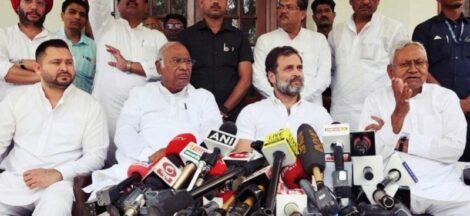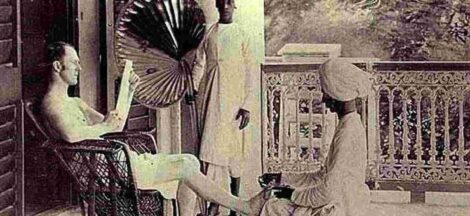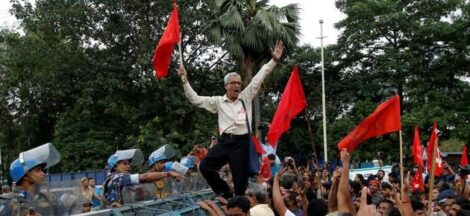Few in the government or public life in India took note
of the International Anti-Corruption Day, which quietly came and went on
December 9, almost unknown, unrecognised. Rarely, a global UN event gets such a
silent reception in India. There was probably no reason to celebrate the event
at a time when the government and its top anti-corruption agency, CBI, are
struggling to protect themselves against a host of hi-profile corruption
charges. In fact, the country is continuously
in the news for corruption at its highest echelons. The government itself is
facing massive corruption charges, from the opposition Congress party, in the
Euro 7.8-billion (worth over Rs.60,000 crore) Rafale deal with France’s
Dassault Aviation for the purchase of 36 multirole fighter aircraft. Though the Supreme Court has given a clean
chit to the government, Rafale’s choice of severely cash-trapped Gujarati
businessman Anil Ambani as private Indian offset partner still remains a
mystery.
On the other
hand, two top executives of India’s most powerful Central Bureau of
Investigation are accusing each other of massive corruption. Such a situation
is unthinkable in any government. CBI is practically lying topless. The stopgap
arrangement is without any fresh decision making power. Congress is now
accusing the government’s Enforcement Directorate, another hi-profile — though
limited purpose — anti-corruption agency, to fix Mrs. Sonia Gandhi’s son-in-law
Robert Vadra on questionable business deals and money laundering charges. The
charges against Vadra are nothing new. However, their sudden hype ahead of the
coming Lok Sabha election, along with the trial of Christian Michel, alleged
middleman in AugustaWestland VVIP chopper purchase deal during the Congress-led
UPA regime, is being interpreted more as a desperate political attempt to fight
the falling public rating of the main ruling party than their real worth.
Hi-profile bribery and corruption cases in India,
involving top politicians and their business underlings, rarely end in conclusive
conviction. In most occasions, they are used as political tools by both the
ruling party and its opposition ahead of national election. However, never
before had the government itself faced such a situation where its No.1 sleuth
in CBI lodged an F.I.R against the No.2 seeking the latter’s arrest and
prosecution in a graft case. CBI named its second-in-command Rakesh Asthana as
an accused in a bribery case along with another agency official and two private
persons.The accused named in the FIR (13A/2018) include CBI Deputy Police
Superintendent Devender Kumar,
Dubai-based investment banker Manoj Prasad and his brother Somesh Prasad. More
than Rs.30 million in bribes were allegedly paid to get relief in a case against
meat exporter Moin Qureshi and others, CBI said. In turn, CBI special director
Asthana has accused the organisation’s director, Alok Verma, of impropriety in
more than a dozen cases. The faultliness have only become deeper. The CBI has
hit a new low, even by its none-too-glorious standards. And, so is the
government’s image.
In his ‘International Anti-Corruption Day’ message, UN
Secretary General Antonio Guterres said corruption which is present in all
countries — Rich and Poor, North and South — “is an assault on the values of
the United Nations.” The World Economic Forum estimates that the cost of
corruption is at least $2.6 trillion – or 5 per cent of global GDP. The World
Bank estimates that businesses and individuals pay more than $1 trillion in
bribes each year. Corruption begets more corruption, and fosters a corrosive
culture of impunity. Although millions of people in the democratic world go to
ballots often with governmental corruption as a key campaign focus, nothing
seems to really change after election. New government quickly compromises with
old corruption practices. Incidentally, political corruption takes precedence
over all other types of corruption. Bribery, cronyism, nepotism, kleptocracy,
speed money, stash funds, legal plunder and electoral fraud generally manifest
political corruption which is at the root of all other forms of corruption.
According to the Transparency International, “in some countries across the Asia
Pacific region, journalists, activists, opposition leaders and even staff of
law enforcement or watchdog agencies are threatened, and in the worst cases,
even murdered”. India shares space with the Philippines and the Maldives among
the worst regional offenders in this respect. The largest contributors to
corruption are entitlement programs and social spending schemes of the Indian
government, including the national rural employment guarantee scheme and
national rural health mission. Among the other routinely big corruptions of
permanent nature is India’s goods truck operating industry which is forced to
pay billions of rupees in bribes annually to numerous regulatory agencies and
police stops on interstate highways.
Elections change administrations in the panchayats, district councils, states and
the centre. But, the corruption trend
seems to continue with vigour, expanding its scope covering newer areas,
with every new election and new government. Laws and regulations to control
corruption appear to open new avenues of corruption. For instance, laws such as FERA and FEMA did
not prevent rising illegal Indian foreign deposits in tax havens. The
privatisation laws offer new opportunities for corruption and public
exploitation. Recently, a seemingly simple takeover of Anil Ambani’s power
supply business in parts of Mumbai by Gautam Adani’s firm immediately led to
massive expansion of electricity bills of consumers, generating protests across
the city. The state is governed by BJP. Ambani and Adani, both Gujaratis, are
known to be close to the power that be. India’s effort to improve ‘the ease of
doing business’ came at a high cost to the common man. The all-too-deep and all
pervasive corruption is adversely affecting the country’s economy. It is a pity
that corruption is holding the economy back from reaching new heights. Instead,
rampant corruption is stunting the country’s development. In the end, it has
made the government’s fight against bribery and corruption almost a joke. (IPA Service)
The post Little To Celebrate Global ‘Anti-Corruption Day’ In India appeared first on Newspack by India Press Agency.


